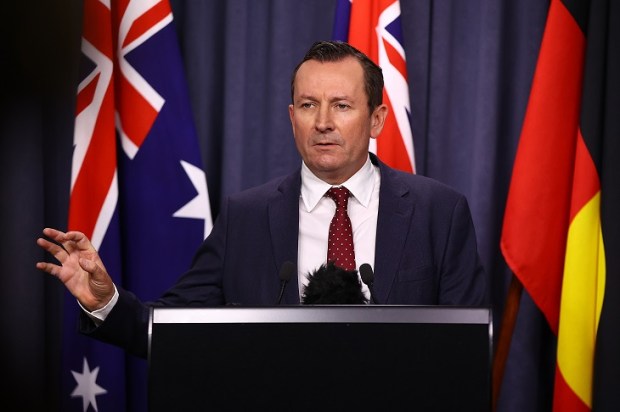The responses of the Australian government to the Covid pandemic had an overwhelming impact on the enjoyment of our basic human rights. This government has exercised coercive powers over its citizens on a scale never previously attempted, not even in wartime when they were faced with a health crisis far more serious than this one. All of this has been carried out by means of executive decrees with minimal parliamentary scrutiny.
The picture we see is of politicians and unelected bureaucrats acquiring a vast concentration of powers with respect of legislation and administration.
Under our system of government, ministers are drawn from Parliament and the minister who loses confidence of Parliament has to resign. And yet, this concept of ministerial responsibility is no more than a laughable fiction. In our parliamentary system, law professor Suri Ratnapala explains:
‘The will of parliament is mostly the will of the executive. In bicameral parliamentary systems, upper houses may check executive ambitions from time to time but they have little time or capacity to police the vast amounts of discretionary power accumulated by the executive under permissive legislation. Therefore parliamentary democracies rely heavily on judicial oversight of executive action. Courts and administrative review tribunals remedy individual grievances but cannot address the general problem of the systematic arbitrariness of government.’1
Insofar as the idea of separation of powers is concerned, under contemporary conditions of parliamentary government in Australia, Sir Harry Gibbs, the late High Court Justice, authoritatively stated:
‘There is no constitutional impediment to the exercise by one branch of government of the powers of another. No statute can be held invalid because it confers powers of one kind on an instrumentality of another kind… The executive and the legislature are closely connected; one the one hand, ministers retain office only so long as they have the confidence of a majority of the House … while on the other hand, the cabinet will normally control the workings of the legislature by means of the majority which it commands.’2
In Australia, the executive branch of government, once it is given a delegated power to legislate, can set aside even the most basic rights of the individual.3
Given the incapacity of the Australian courts to limit executive discretion, it shouldn’t really come as a surprise that, in Kassam v Hazzard; Henry v Hazzard (2021)4, Chief Justice Beech-Jones of the New South Wales Supreme Court dismissed the plaintiffs’ challenge that state executive (public health) orders have violated the constitution.5
Under our current system of government, writes Professor Ratnapala:
‘The executive has become the master of the legislative agenda, gaining a degree of power over the legislature not enjoyed even by the Tudor monarchs … In one of the great ironies of political history, the growth of Parliament’s legal power to remove a government from office actually reduced its political power to hold a government to account.’6
In Australia, governments can accumulate an enormous power to determine policy outside parliament.7
According to law professor Nicholas Aroney:
‘There is a tendency for both executive and legislative power to be concentrated effectively in a very small group of senior ministers, dominated by the prime minister or premier.’8
As a result, few are the laws that cannot be voluntarily changed by those who command the majority in Parliament. These politicians ‘are legally bound by written constitutions, but are not by moral rights and common law principles’, writes law professor Jeffrey Goldsworthy.9
This makes accountability incredibly difficult to achieve. To make it more complicated ‘the High Court, despite having full judicial power has declined to impose on Parliament any significant constraint on its competence to delegate its legislative power to the executive’.10 As noted by Sir Harry Gibbs, ‘The Court has paid no more than lip service to that principles when it has come to consider the separation between legislative and executive power.’11 For example, in Victorian Stevedoring and General Contracting Co Pty Ltd and Meakes v Dignan (1931), the court decided that, within the limits of delegated legislation, the power of the executive to legislate is ‘unregulated’ and its discretion is ‘unguided’.
This is very much like ‘entrusting the sheep to the wolf’.12 After all, as Ratnapala points out, ‘The rule against the delegation of wide law making power to the executive is a major component of the classical doctrine of separation of powers. When officials can both legislate and execute their legislation, they have the potential to place themselves above the law, for the “law” is what they command.’13
Professor Ratnapala then laments that the courts in Australia have chosen to not draw a clear line in the sand against excessive delegation of power to the executive, despite parliamentary democracies needing to rely on judicial oversight of executive action.14
However, the courts in Australia have generally accepted that the executive’s capacity to legislate ‘may be exercised in disregard of other existing statutes, the provisions of which concerning the same subject matter may be overridden’.15 This indicates that the executive is often endowed with a function that is essentially legislative in nature.16 According to Gibbs, these courts ‘have accorded to Parliament a virtually unfettered power to delegate to the executive the power to make laws, and have held that such a delegation will be valid even though the Parliament does not prescribe any principles or standards to govern the exercise of the powers’.17
Sir Henry Gibbs also reminded us that the weakness with which the doctrine of separation of powers is applied in Australia ‘removes any obstacle to the growth of the executive’.18 This includes any legal disputes that are entrusted to executive tribunals even when the exercise of such a power is entirely judicial in nature.19 These delegations of judicial power are often expressed in the widest and most general terms, confiding to the executive a subordinate power that is not necessarily controlled by any principle or standard laid down by the legislature.20
Above all, according to the late Chief Justice:
‘The fact that the Constitution gave Australians a system of responsible government on the British model provided a sufficient indication of an intention to reject altogether the principle of the separation of powers, notwithstanding the close resemblance between the relevant provisions of the Australian Constitution and those of the United States Constitution.’21
It is therefore no surprise that so many our most fundamental human rights can be so easily violated.
Since there is no effective legal-institutional mechanism in Australia to hold government to account, the effect is that politicians are unaccountable to anyone except at some periodic elections.22
The present operation of our parliamentary system undoubtedly facilitates what Lord Hailsham once described as an ‘elective dictatorship’.23 This, he said, is due to the enormous power acquired by the political group or faction with an overall majority in the Lower House.
And even if Lord Hailsham’s warning about elective dictators seemed an overstatement in 1976, it has certainly become far more of a tragic reality in our troubled times, and especially here in Australia.
Augusto Zimmermann LLB, LLM cum laude, PhD, CIArb, DipEd, is Professor and Head of Law at Sheridan Institute of Higher Education in Perth, WA. He is also Adjunct Professor of Law at the University of Notre Dame Australia, Sydney campus. From 2012 to 2017, Professor Zimmermann served as a Law Reform Commissioner in Western Australia and, while teaching legal theory and constitutional law at Murdoch University, he was awarded the 2012 Vice Chancellor’s Award for Excellence in Research, as well as two Law School Dean’s Research Awards, in 2010 and 2011.
1 Suri Ratnapala, ‘Separation of Powers: The Cornerstone of Liberty under Law’, in Suri Ratnapala and Gabriël A. Moens, Jurisprudence of Liberty (2nd ed., LexisNexis, 2011) 55.
2 Sir Harry Gibbs, ‘The Separation of Powers – A Comparison’ (1987) 17 Federal Law Review 151, 152.
3 Suri Ratnapala, ‘Separation of Powers: The Cornerstone of Liberty under Law’, in Suri Ratnapala and Gabriël A. Moens, Jurisprudence of Liberty (2nd ed., LexisNexis, 2011) 55.
4 [2021] NSWSC 1320
5 At [275]
6 Suri Ratnapala, ‘Separation of Powers: The Cornerstone of Liberty under Law’, in Suri Ratnapala and Gabriël A. Moens, Jurisprudence of Liberty (2nd ed., LexisNexis, 2011) 79.
7 Suri Ratnapala, ‘Separation of Powers: The Cornerstone of Liberty under Law’, in Suri Ratnapala and Gabriël A. Moens, Jurisprudence of Liberty (2nd ed., LexisNexis, 2011) 76.
8 Nicholas Aroney, ‘Bicameralism and Representations of Democracy’, in: Nicholas Aroney, Scott Presser, and J R Nethercote (eds.), Restraining Elective Dictatorship (University of Western Australia Press, 2008) 29.
9 See: Jeffrey Goldsworthy, The Sovereignty of Parliament: History and Philosophy (Clarendon Press, 1999) 1.
10 Suri Ratnapala, ‘Sri Lanka at the Constitutional Crossroads: Gaullist Presidentialism, Westminster Democracy or Tripartite Separation of Powers’ (2003/2004) LAWASIA Journal 33, 55.
11 Sir Harry Gibbs, ‘The Separation of Powers – A Comparison’ (1987) 17 Federal Law Review 151. 154.
12 Suri Ratnapala, ‘Sri Lanka at the Constitutional Crossroads: Gaullist Presidentialism, Westminster Democracy or Tripartite Separation of Powers’ [2003/2004] LAWSIA Journal 33, 54. See also: Augusto Zimmermann & Lorraine Finlay, ‘Suri Ratnapala’s Contribution to the Understanding of the Rule of Law’ (2014) 33 (2) University of Queensland Law Journal 367, 368-72.
13 Suri Ratnapala, ‘Sri Lanka at the Constitutional Crossroads: Gaullist Presidentialism, Westminster Democracy or Tripartite Separation of Powers’ (2003/2004) LAWASIA Journal 33, 49.
14 Suri Ratnapala, ‘Sri Lanka at the Constitutional Crossroads: Gaullist Presidentialism, Westminster Democracy or Tripartite Separation of Powers’ (2003/2004) LAWASIA Journal 33, 55.
15 (1931) 467 CLR 73.
16 Sir Harry Gibbs, ‘The Separation of Powers – A Comparison’ (1987) 17 Federal Law Review 151, 155.
17 Sir Harry Gibbs, ‘The Separation of Powers – A Comparison’ (1987) 17 Federal Law Review 151, 155.
18 Sir Harry Gibbs, ‘The Separation of Powers – A Comparison’ (1987) 17 Federal Law Review 151, 161.
19 Sir Harry Gibbs, ‘The Separation of Powers – A Comparison’ (1987) 17 Federal Law Review 151, 153.
20 Sir Harry Gibbs, ‘The Separation of Powers – A Comparison’ (1987) 17 Federal Law Review 151, 156.
21 Sir Harry Gibbs, ‘The Separation of Powers – A Comparison’ (1987) 17 Federal Law Review 151, 154. (emphasis ours)
22 Jonathan Sumption, Law in a Time of Crisis (Profile Books, 2022) 220.
23 Q. Hogg, A Sparrow’s Flight (HarperCollins, 1990) 318.
Got something to add? Join the discussion and comment below.
Get 10 issues for just $10
Subscribe to The Spectator Australia today for the next 10 magazine issues, plus full online access, for just $10.


























Comments
Don't miss out
Join the conversation with other Spectator Australia readers. Subscribe to leave a comment.
SUBSCRIBEAlready a subscriber? Log in